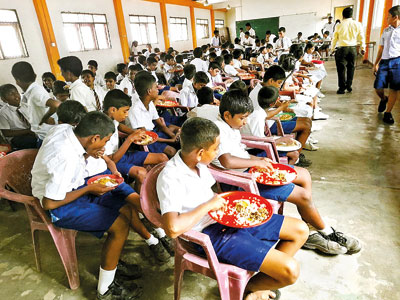News
Govt’s nutrition-boosting school meal programme: Suppliers face bitter reality
View(s):By Hafsa Sabry
With the focus on addressing the nutritional deficiency in primary schoolchildren and bolstering their academic performance, the government has resumed the school mid-day meal programme, but it has faced some snags.
The Education Ministry’s School Food and Nutrition Director, Ganga Dilhani, emphasised that the primary objective of this initiative was to enhance the nutritional status of schoolchildren rather than merely address hunger.
However, the implementation of this initiative has encountered challenges, particularly in rural areas, where concerns have been raised regarding the difficulty in finding suppliers willing to provide meals at the price set by the ministry. Besides, the government’s reimbursement system entails payments processed through provincial offices and poses logistical hurdles, with delays potentially stretching up to two weeks beyond the one-month payment period.

Happy hour: Schoolchildren enjoying their mid-day meal at Ananda College, Modera
Conversely, schools in urban areas, such as Colombo, have demonstrated a more positive response. Principals interviewed by the Sunday Times affirmed their readiness to secure suppliers and have already begun providing free meals to students promptly upon government request.
At Modera Ananda Central College, Principal U.B.P. Dissanayake said that even before the government came up with its initiative, they had been implementing a school meal programme with the support of parents and funding from the All Ceylon Buddhist Congress, particularly to provide meals to economically disadvantaged children. “We also provide food for the whole school, not just primary, and we have been doing it for a while now.”
The principal’s offer to assist other schools facing challenges in securing suppliers underscores a collaborative approach to overcoming obstacles in programme implementation. Given the substantial cost implications of providing meals for a large student population, schools and school-appointed committees are compelled to engage multiple suppliers, adding complexity to the process.
Moreover, the approval process by government Public Health Inspectors (PHIs) for designated suppliers further complicates matters, contributing to delays in the implementation of the programme.
“There are around 50 items on the checklist, and the supplier needs to be checked for everything before approval is given. This is a good process, but it adds to the problem of finding a supplier in the given time,” a Piliyandala school principal said.
“They check the kitchen area to ensure it is clean and free of pests and domestic animals such as cats and dogs. They check whether the kitchen has a ceiling, proper ventilation, or tiled floors, among other criteria. The main focus is on ensuring that food can be prepared in a clean environment using proper hygienic methods,” he said.
Additionally, concerns have been raised regarding the adequacy of the allocated funds, with suppliers citing inflationary pressures that make it challenging to meet the nutritional requirements within the provided budget.
After the suppliers took up this issue with government officials, assurances were given regarding the provision of rice and dhal to supplement the meals, with a corresponding adjustment in the allocated budget. The Rs. 85 per meal will be reduced to Rs. 65 if the provisions are provided. However, principals in the outstations have not received any formal communication in this regard.
Despite these challenges, the overarching objective of the government initiative remains clear: to promote holistic child development by ensuring access to nutritious meals that support overall well-being and academic success.
However, All Ceylon Teachers’ Union General Secretary Joseph Stalin has highlighted discrepancies regarding the government’s funding allocation for an earlier programme initiated in October 2022. “Initially, the cabinet decided to allocate Rs. 2 million for this programme. However, after two years, it came to light that only 1.6 million rupees had been allocated,” he said.
Mr. Stalin expressed concern that this shortfall in funding had led to difficulties in implementing the programme effectively.
Commenting on the current programme, he said suppliers were struggling to provide meals at the price of Rs 85 per child, in keeping with the requirements.
He said the shortfall indicated a lack of genuine commitment on the part of the government.
According to a rural school principal, who is also a member of the All Ceylon Principal Association, the menu prescribed for the programme includes five dishes daily: rice, dhal, fish or egg, green leafy vegetables, and a serving of fruit.
However, with the current budget constraints, it is becoming increasingly challenging for schools to adhere to this menu while ensuring adequate nutrition for the children. “Somehow, we have managed to finalise ten suppliers, and we will be starting the programme next week,” he added.
Mr. Stalin’s remarks highlight the need for greater transparency and accountability in the implementation of government initiatives, particularly those aimed at improving the well-being of schoolchildren. The inadequate allocation of funds raises valid concerns about the feasibility and sustainability of the programme in its current form.
The best way to say that you found the home of your dreams is by finding it on Hitad.lk. We have listings for apartments for sale or rent in Sri Lanka, no matter what locale you're looking for! Whether you live in Colombo, Galle, Kandy, Matara, Jaffna and more - we've got them all!

